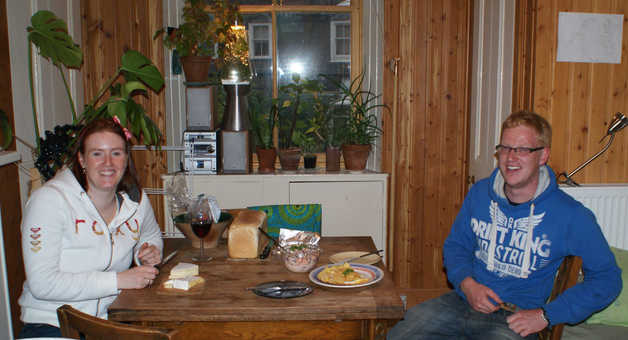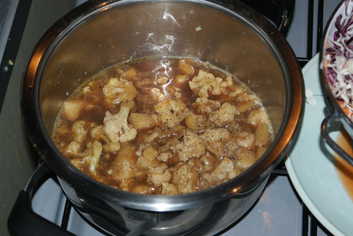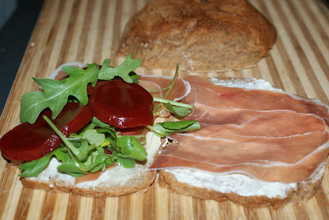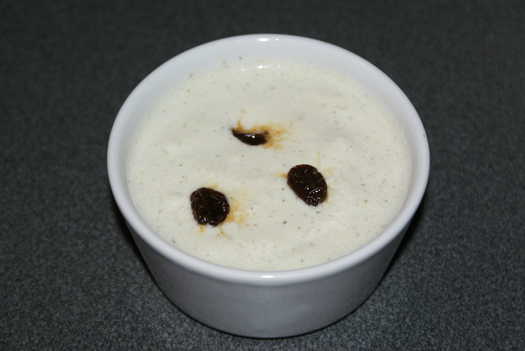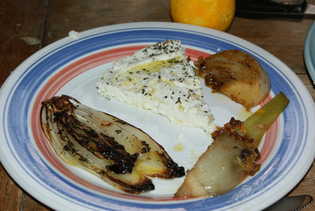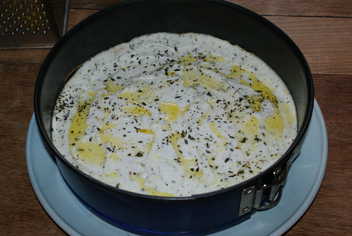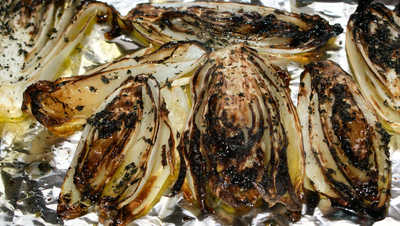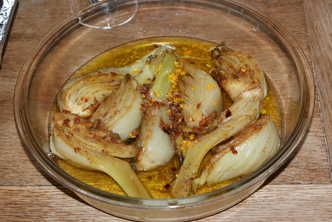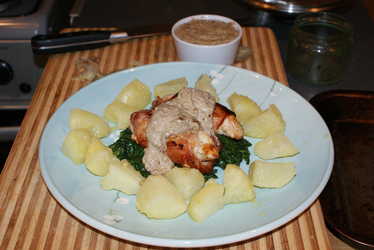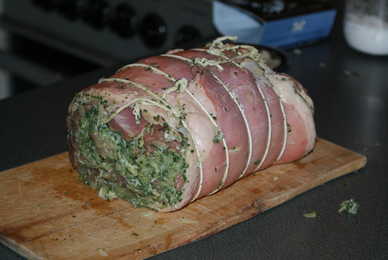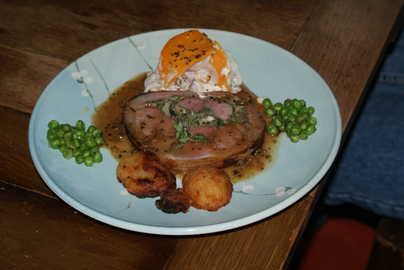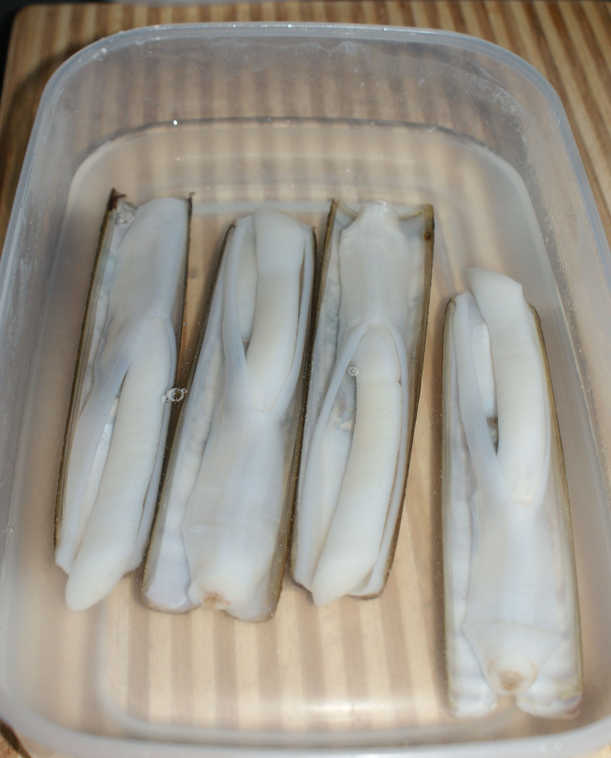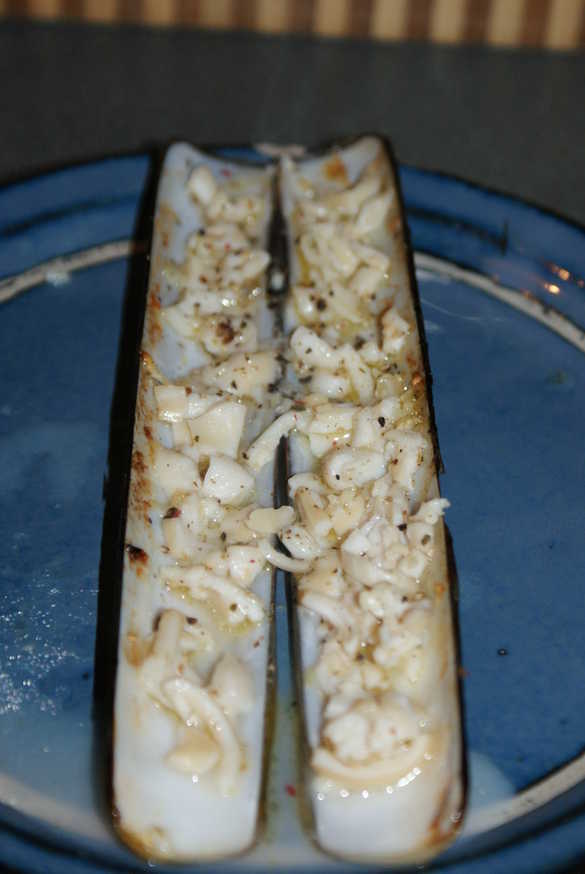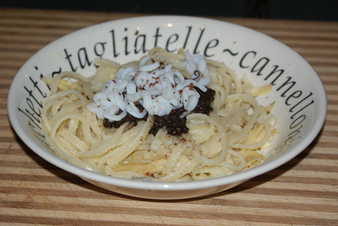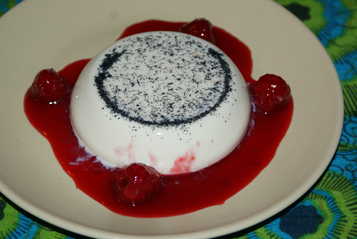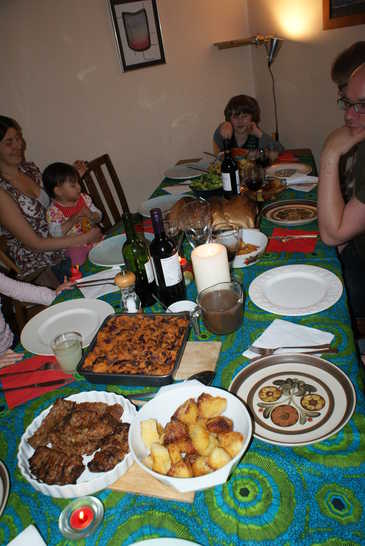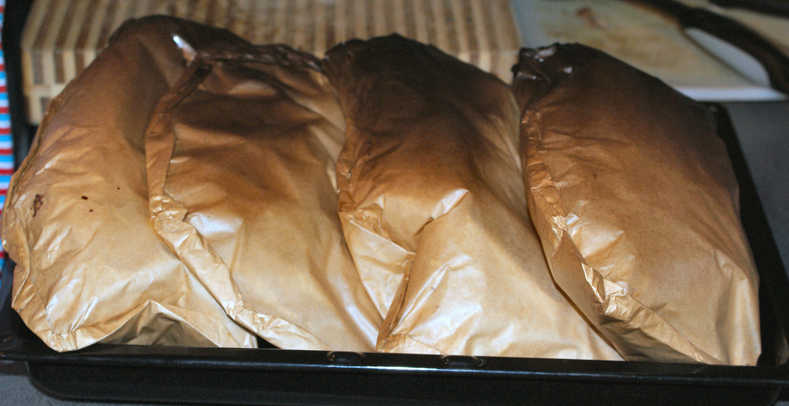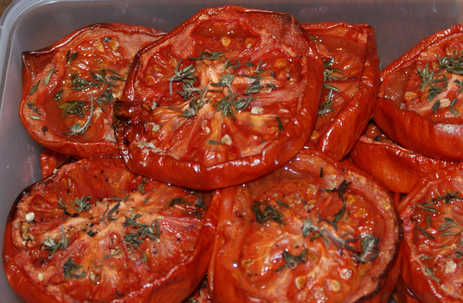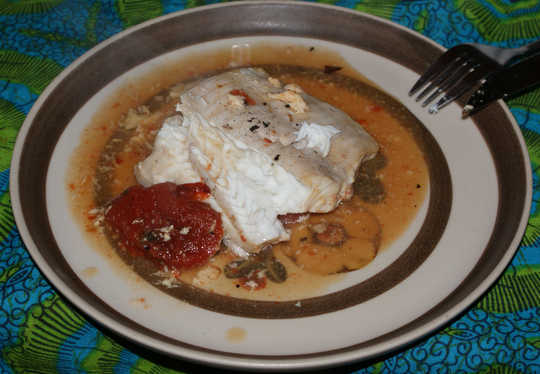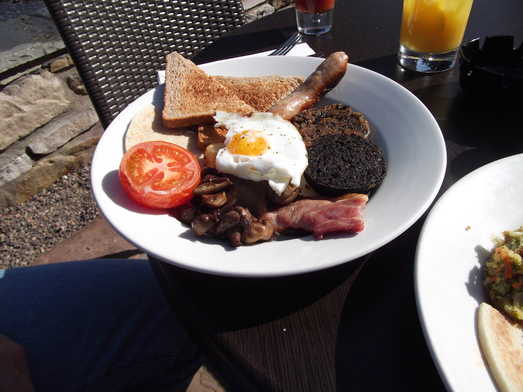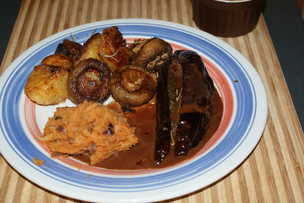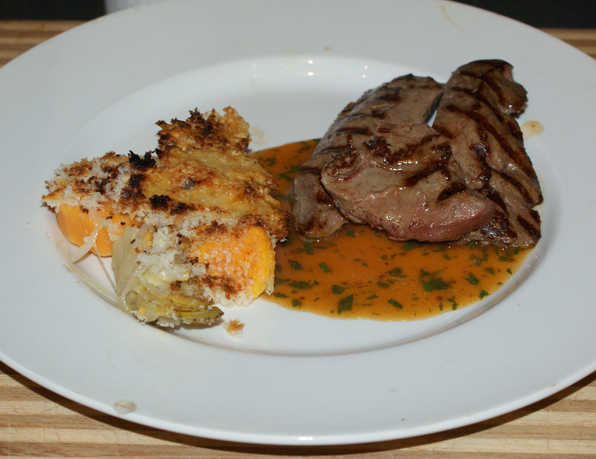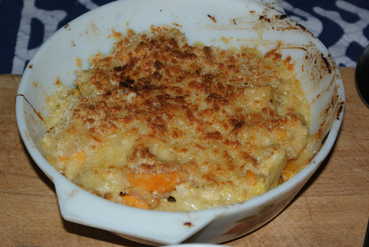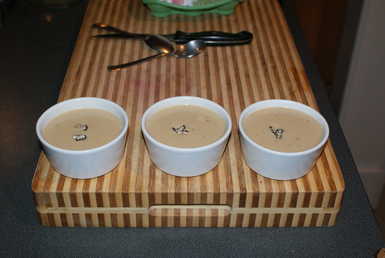
Spare Eggs, Truffles and Callum

Flora came around for dinner and brought her spare eggs (hen's eggs, I'm not suggesting some kind of insemination troika here) and, unexpectedly, Callum.
Callum hasn't eaten at Chez Karl before.
Welcome Callum - a new guest to add to my collection!
Last weekend I was buying liquorice roots in Real Foods, and had my eye caught by a basket of summer truffles, ingeniously placed by the till. Since they were pretty cheap (summer truffles are very definitely black truffles' poor relations), I decided to give one a good home, and finally dust off my copy of Truffles - Ultimate Luxury - Everyday Pleasure - a Border's bargain cookbook I've had around for a long time without ever opening it.
The book has no particular summer truffle recipe, but I rather fancied trying out their less fragrant, more earthy tones with a cauliflower base so I adapted a Cream of Cauliflower Soup with White Truffle. Which seems a more authentic approach anyway - since white truffle oil doesn't actually contain any truffle as you know.
I wanted to avoid boiling the truffle, and just added it for the final heating. I thought I'd finely slice the whole truffle, but to be honest the crunchiness is slightly distracting and the actual flavour of the truffle is practically non-existent. It's also quite tedious - the truffles are really hard! So I prepared a few nice slices to use as a garnish and then grated the rest of the truffle as finely as I could on a nutmeg grater. When you add it to warming soup and the truffle fires up you get a terrific earthy musk.
I couldn't think of anything very exciting (and seemly) to do with Flora's eggs, so we just had Brie omelette, but I did make up some coleslaw using up the horseradish cream I had lying around from my pastrami sandwiches at Port Edgar's two-handed race.
It goes pretty well with omelettes I suppose, if you like coleslaw. Could have done with some chips though.
Hmmmmmmmmm. Chips.
Homemade coleslaw and truffle soup - Callum wanted to know if I cooked like this every night.
Isn't he sweet?
Cream of Cauliflower Soup with White Truffle
soup
Or in this case, Cream of Cauliflower Soup with Black Truffle.
Serves 4
Ingredients
- 1 tablespoon unsalted butter (15g)
- 1 small onion, minced
- 2 cups chicken stock (500ml/400g)
- 3 cups cmall cauliflower florets (about ½ large cauliflower) (270g)
- 1 small Yukon Gold or waxy potato, peeled and coarsely chopped
- ½ teaspoon salt, or more to taste
- generous pinch of freshly ground white pepper
- 1 cup double cream (250ml)
- 1 tablespoon white truffle oil, plus extra for drizzling or 1 summer truffle
- tiny chervil or flat-leaf parsley sprigs for garnish or slices of truffle
Melt the butter in a large heavy pot over a moderate heat.
Add the onion and cook, stirring frequently, until soft and translucent, about 5 minutes.
Add the stock, cauliflower, potato, salt, and white pepper and bring to a boil over high heat.
Reduce the heat and boil gently, stirring occasionally, until the cauliflower and potato are very soft, 17 to 20 minutes.
Remove from the heat.
Puree the soup, in batches if necessary, in a blender or food processor. (The soup can be made ahead to this point, covered and refrigerated for up to 1 day.)
Return the soup to the pot and stir in the cream.
Ladle the soup into bowls and drizzle a little extra truffle oil over the top of each one. Garnish and serve.
Puree the soup, in batches if necessary, in a blender or food processor. (The soup can be made ahead to this point, covered and refrigerated for up to 1 day.)
Return the soup to the pot and stir in the cream.
Grate in the summer truffle, if using, with a nutmeg or other fine grater.
Reserve some thin slices of the truffle for garnish.
Heat over moderately low heat, stirring frequently, until hot; do not boil.
Season with additional salt to taste.
Remove from the heat and stir in the truffle oil until well blended.Ladle the soup into bowls and drizzle a little extra truffle oil over the top of each one. Garnish and serve.
Lovely!
The stock I used was very rich and might have been beef, but the soup was still delicious. I used a grated summer truffle which imparts a delightful aroma when warmed with the cream (though the slices have no discernable flavour). Allow the soup enough gentle warming time for the flavour to appear.
The stock I used was very rich and might have been beef, but the soup was still delicious. I used a grated summer truffle which imparts a delightful aroma when warmed with the cream (though the slices have no discernable flavour). Allow the soup enough gentle warming time for the flavour to appear.
Two Handed Soup and a Sandwich
So what could be better than spending the day alone in a small boat with your ex-partner?
Especially an ex-partner with whom being in a small boat was the source of constant friction when you were together?
Exactly - so that's what Rachel and I did today, entering a 707 in the yacht clubs's two-handed race. Rachel helmed.
It's best to let Rachel helm. She sulks otherwise.
Being such a special occasion and all, I thought I'd try baking rye bread and making up some pastrami sandwiches for our lunch. Possibly I made this decision at Valvolla and Crolla's olive oil tasting, (yes they do olive oil tastings) where I found myself hugely excited by their display of fine meats.
I also happened to be browsing Tattie Shaws just down the road and they had some horseradish, which I figured that would go nicely with the pastrami (it's beef after all), so I made up a batch of creamed horseradish mostly following the version in Nose To Tail Eating.
Which is a terrific little book by the way, and grows on me more every time I use it.
The rye bread was good - very good actually for a first attempt, the horseradish sauce excellent (be warned though - grating horseradish makes your eyes bleed), but the sandwiches were just a bit meh.
They were a somewhat dried out by the time we ate them, for one thing. I should probably have been more generous with the horseradish sauce, sandwiches do tend to lose much of their flavour marinating in a not-so-dry bag for a morning. Fortunately I still have half a rye loaf left to experiment with.
Later it occurred to me that I should really have fed Rachel with Rachel sandwiches - the female equivalent of the famous Reuben sandwich.
A Reuben, for those of you not lucky enough to have lived in New York City, is a grilled sandwich of rye bread with corned beef, swiss cheese, sauerkraut and Russian or Thousand Island dressing. Best served with a gherkin.
So anyway, I made a more humble and more ordinary pastrami on rye. I rather fancied that slices of pickled beetroot might work well instead of gherkin, so I gave them a shot, under-lathered on some horseradish cream and topped off with a rockety/watercressy salad.
In anticipation of a gloriously sunny day I also decided to make up a flask of chilled cucumber, mint and fennel soup, together with a plastic container of brandy-marinating raisins.
I have at least learned from bitter experience not to add ice cubes to chilled soup to keep it cool - since they just lurk stubbornly unmelting in wait for unwary drinkers with sensitive fillings.
I think Rachel was impressed with my ridiculous efforts, though she did ask somewhat archly exactly how much cream there was in her soup, but unfortunately it turns out that during a two-handed race there is no free time to sample fancy sandwiches or novelty soups. It wasn't until after the race that I had the chance to show them off.
Rachel reckoned that we'd have been better off just stuffing a couple of flapjacks in our pockets.
Ingrate.
Exactly - so that's what Rachel and I did today, entering a 707 in the yacht clubs's two-handed race. Rachel helmed.
It's best to let Rachel helm. She sulks otherwise.
Being such a special occasion and all, I thought I'd try baking rye bread and making up some pastrami sandwiches for our lunch. Possibly I made this decision at Valvolla and Crolla's olive oil tasting, (yes they do olive oil tastings) where I found myself hugely excited by their display of fine meats.
I also happened to be browsing Tattie Shaws just down the road and they had some horseradish, which I figured that would go nicely with the pastrami (it's beef after all), so I made up a batch of creamed horseradish mostly following the version in Nose To Tail Eating.
Which is a terrific little book by the way, and grows on me more every time I use it.
The rye bread was good - very good actually for a first attempt, the horseradish sauce excellent (be warned though - grating horseradish makes your eyes bleed), but the sandwiches were just a bit meh.
They were a somewhat dried out by the time we ate them, for one thing. I should probably have been more generous with the horseradish sauce, sandwiches do tend to lose much of their flavour marinating in a not-so-dry bag for a morning. Fortunately I still have half a rye loaf left to experiment with.
Later it occurred to me that I should really have fed Rachel with Rachel sandwiches - the female equivalent of the famous Reuben sandwich.
A Reuben, for those of you not lucky enough to have lived in New York City, is a grilled sandwich of rye bread with corned beef, swiss cheese, sauerkraut and Russian or Thousand Island dressing. Best served with a gherkin.
Americans have a simplified system of cheese classification. Not for them the rich complexities of bries, cheddars, goudas, blue cheeses or curds.
They have Swiss (yellow with holes in it - tastes of Styrofoam), Muenster (white with an orange rind - tastes of Styrofoam),
String (orange and runny - tastes of Styrofoam) and American (orange and turgid - tastes of Styrofoam).
A Rachel on the other hand, substitutes pastrami for the corned beef, and coleslaw for the sauerkraut.So anyway, I made a more humble and more ordinary pastrami on rye. I rather fancied that slices of pickled beetroot might work well instead of gherkin, so I gave them a shot, under-lathered on some horseradish cream and topped off with a rockety/watercressy salad.
In anticipation of a gloriously sunny day I also decided to make up a flask of chilled cucumber, mint and fennel soup, together with a plastic container of brandy-marinating raisins.
I have at least learned from bitter experience not to add ice cubes to chilled soup to keep it cool - since they just lurk stubbornly unmelting in wait for unwary drinkers with sensitive fillings.
I think Rachel was impressed with my ridiculous efforts, though she did ask somewhat archly exactly how much cream there was in her soup, but unfortunately it turns out that during a two-handed race there is no free time to sample fancy sandwiches or novelty soups. It wasn't until after the race that I had the chance to show them off.
Rachel reckoned that we'd have been better off just stuffing a couple of flapjacks in our pockets.
Ingrate.
Cucumber, Mint and Fennel Chilled Soup
soup veg
I was a bit disappointed with my recent
chilled cucumber soup
so I thought I'd try this one. It's rather nice, but very rich.
Serves 6-8
Ingredients
- 1 cucumber, seeds scooped out and flesh sliced finely
- 2 garlic cloves, crushed
- 1 tablespoon tarragon vinegar
- 1 tablespoon chopped fresh mint
- 300ml/½ pint single cream
- 300ml/½ pint fromage frais
- 2 eggs, hard-boiled and finely chopped
- ½ fennel bulb, finely sliced on a mandoline
- 100g/3½ oz raisins, soaked in brandy
- salt and freshly ground black pepper
Either mix all the ingredients bar the raisins together coarsely or blitz until really smooth, it's up to you.
Personally, I as in Simon Rimmer prefer it smooth. Chill thoroughly.
Serve really well chilled in shot glasses or espresso cups, with a few room-temperature boozy raisins on top of each.
Serve really well chilled in shot glasses or espresso cups, with a few room-temperature boozy raisins on top of each.
Pretty rich and creamy - you should definitely serve it in small quantities.
Even if you process the lot, it's still a good idea to finely slice the fennel and finely chop egg first. It cuts down on the stringiness.
Even if you process the lot, it's still a good idea to finely slice the fennel and finely chop egg first. It cuts down on the stringiness.
Fabulously Fennel

Finally I found some fabulous fennel fare!
As faithful followers of fashion will know I've been trying to find a robust fennel dish for years now, braising with vodka, baking with breadcrumbs, grilling with cheese, always slightly disappointed by how watery and underwhelming the dish turned out to be. But not any more - thanks to the Rebel Cook all my fennel failures are forsworn. Now I have a braised fennel dish to be proud of.
I came across the book in one of my many, many trips to the Starbucks in what used to be Waterstones near my work. Well nearish my work - but that's a whole other story. Not that I willingly shop at Starbucks you understand, but there are no Police Box coffee bars or other quality outlets anywhere nearish my work.
And they do that Christmas eggnog thing. Hmmmmmmmm eggnog.
So anyway, this cookbook on the bargain books table caught my eye and ended up in my collection. It's got some very innovative recipes in it (fennel and anchovies!), but this is the first one I've got around to trying. Like many of my recipe books the pleasure is more in the owning than the using. Which is slightly sad really.
Must try harder.
Today's dinner turned into a surprisingly nice ad-hoc meal - I also tried out a couple of Nigella Lawson's summery recipes: a gently pleasing baked ricotta with a slightly more aggressive grilled chicory.
Completely vegetarian too as requested by Flora who is apparently meatbound after her viking voyage to the Shetland Isles. Except for the anchovies of course.
Not in Flora. In the braised fennel.
So not completely vegetarian at all then.
What's that you say?
Actually we aren't attending an Alliteration Day activity after all? Arse!
Baked Ricotta
starter main veg cheese
Ricotta baked with beaten egg whites.
Light and fluffy this is really quite nice - I threw in the chopped fronds of my fennel bulb too,
and I'm sure you could use whatever herbs you fancy.
Don't be too timorous with the salt - you can probably use half a teaspoon or more.
Nigella reckons this will feed 6 people - maybe as a lunch-time snack it will. For dinner it will feed 4. If they're not too hungry.
I already googled Springform Tin for you :)
Don't be too timorous with the salt - you can probably use half a teaspoon or more.
Nigella reckons this will feed 6 people - maybe as a lunch-time snack it will. For dinner it will feed 4. If they're not too hungry.
I already googled Springform Tin for you :)
Serves 4
Ingredients
- 500g ricotta cheese
- 2 egg whites, lightly beaten
- 1 tablespoon chopped fresh thyme
- Zest of 1 lemon
- salt and pepper
- 2 tablespoons olive oil
Pre-heat the oven to 180/gas mark 4.
Mix the ricotta with the beaten egg whites and add most of the chopped thyme, the lemon zest and generous salt and pepper.
Brush a 20cm Springform tin with oil, and pour in the ricotta mixture then drizzle with olive oil and scatter a little more chopped thyme over the top. Don't be alarmed at how shallow this is; it is not intended to be other than a slim disc.
Sit on a baking sheet it will leak oil for one thing and cook in the oven for about 30 minutes. The baked ricotta will rise a little and set dry on top, but will not turn a golden colour like a cake.
Mix the ricotta with the beaten egg whites and add most of the chopped thyme, the lemon zest and generous salt and pepper.
Brush a 20cm Springform tin with oil, and pour in the ricotta mixture then drizzle with olive oil and scatter a little more chopped thyme over the top. Don't be alarmed at how shallow this is; it is not intended to be other than a slim disc.
Sit on a baking sheet it will leak oil for one thing and cook in the oven for about 30 minutes. The baked ricotta will rise a little and set dry on top, but will not turn a golden colour like a cake.
It seems to be ready when it feels firm but springy to the touch.
A touch of brown at the edges is as cooked as you want it to get.
Let the tin cool a little before springing open, and removing to a plate.
Leave to cool a little longer, then cut into wedges and eat, still warm, with a salad or grilled radicchio.
Definitely summery, light and gentle on the palate.
Grilled Radicchio
starter side veg vegan
Seeing as I couldn't find any radicchio, and seeing as how it's a variety of chicory, I used chicory.
Seeing as how chicory is a lot slimmer I just cut them lengthways into three slices each held together at the stem end.
Seeing as how chicory is a lot slimmer I just cut them lengthways into three slices each held together at the stem end.
Serves 4
Ingredients
- approx. 6 tablespoons olive oil
- 2 tablespoons chopped fresh thyme
- 1 large radicchio, cut into eighths lengthways or 2 chicory bulbs cut into thirds lengthways
- 1 lemon to serve
Preheat the grill.
If your grill is as poxy as mine you might need to leave it on overnight!
Mix the olive oil and thyme in a shallow bowl, and then wipe the radicchio slices in the herby oil before grilling them for a few minutes, turning them as necessary, until slightly wilted and golden at the edges.
Add a squeeze of lemon at the end before serving. They go well with baked ricotta.
Mix the olive oil and thyme in a shallow bowl, and then wipe the radicchio slices in the herby oil before grilling them for a few minutes, turning them as necessary, until slightly wilted and golden at the edges.
Add a squeeze of lemon at the end before serving. They go well with baked ricotta.
Pleasant (particularly the smell of toasting thyme), but still a touch bitter.
Partly that might have been due to my using chicory rather than radicchio.
I think brushing with a full-on thyme vinaigrette might take more of the edge off.
Braised Fennel
Fennel braised in garlic, anchovies and maple syrup with orange zest.
side
An odd but inspired collection of flavours this really is fabulous fennel.
Soft-cooked and succulent, if a little greasy.
The orange zest is the perfect finish, but watch you don't overdo it.
Simon Rimmer seems to reckon this will feed 6, but I beg to differ!
The orange zest is the perfect finish, but watch you don't overdo it.
Simon Rimmer seems to reckon this will feed 6, but I beg to differ!
Serves 4
Ingredients
- 10 oz/300g fennel
- 4 fl oz/125ml olive oil
- pinch dried chilli flakes and no more, unless you want it noticeably spicy
- 2 cloves garlic, pressed
- 3-4 salted anchovies, finely chopped though I used anchovies in oil, so it can't be too critical
- 1 fl oz/25ml maple syrup
- zest of 1 orange
Halve the fennel bulbs or quarter them if they're large and cook in
acidulated, if you like salted boiling water
for about 8 minutes until soft and easily pierced with a knife.
Drain, plunge into cold water and set aside. If the pieces are still quite large, cut them in half again.
In a pan which will just fit the fennel pieces heat the olive oil and fry the chilli flakes, garlic and and then the anchovies until the anchovies are melting. Add the maple syrup and stir well. Next add the fennel and coat well with the sauce.
Cook for about 5 minutes, then stir in the zest at the last minute and serve.
Drain, plunge into cold water and set aside. If the pieces are still quite large, cut them in half again.
In a pan which will just fit the fennel pieces heat the olive oil and fry the chilli flakes, garlic and and then the anchovies until the anchovies are melting. Add the maple syrup and stir well. Next add the fennel and coat well with the sauce.
Cook for about 5 minutes, then stir in the zest at the last minute and serve.
Such fabulous fennel!
The Best Un-Barbecue Barbecue

Stormbound in Pittenweem. AGAIN!
We had always planned to overnight in Pittenweem, and we weren't going to let the fact that a hurricane was forecast, or the annual Un-Bass Rock Race course had once again been shortened to a big circle, get in our way!
We had a lovely barbecue organised and the weather was perfect for cooking up on the quay-side so after a delightful Saturday race we turned right back around, put up the spinnaker and sailed straight to Pittenweem where we we tied up, cracked open the Cava, unshipped the hunka meats and pulled out the bag of charcoal, the starter fluid and ... the lawnmower?
So where's the barbecue? Oops. Back in the garage :(
So we had to improvise an un-barbecue on the galley stove, and rather well too I thought. Not that it affected the vegetarian crewmate overmuch, since cheese is the closest thing we have to a vegetable on board. Fortunately one of the redeeming features of Pittenweem is a decent chip shop. Fish is a vegetable right?
Come the next morning, though, we discovered why all those other boats had decided to go home - the hurricane had arrived and the boat was bouncing around like a frog in a blender, even snapping the sternline at one point. So we tried to make our escape but completely failed to get the boat to turn through the howling wind into the harbour entrance and several attempts later had to give up and tie the boat back to the quay-side.
That meant skipper John and I staying on board to check and adjust the lines every hour (every goddamn hour) while the rest of the crew made their pathetic excuses and abandoned ship.
It took two more days for the wind to drop enough for us to get out, but apart from running out of milk (not helped by Pittenweem's single grocery shop closing at Sunday lunchtime) we had plenty of stores on board, as usual, and managed to keep our spirits up with the Cava and the GinAndTonics.
I turned out some very tasty Bacon-wrapped chicken parcels in a packet (a packet oh the humanity!) of peppercorn sauce, and we eventually got a pleasant sail back up the river arriving home by 2 a.m. Tuesday morning - just in time to get back to work!
The Best Un-Barbecue Barbecue
main meat nautical
For when you have all the material for a fine barbecue. But no barbecue.
Ingredients
- barbecue food
- Cava
- lemon/lime juice
- condiments tomato sauce/brown sauce/barbecue sauce
Forget about all that barbecueing nonsense - just pan-fry all your lovely ingredients!
Fry them in a sensible order though so that the more succulent things get done last and don't sit around too long. So pork chops first. Steaks next. Burgers last.
Put a roasting tin in a low oven, covered with tin foil, and as each pan of fried goodies is ready add it to the tin. After each frying, pour off any massive amount of excess fat, then deglaze with some of the spare Cava you'll have lying around and add to the roasting tin. Periodically moisten the contents of the roasting tin with a squeeze of lime or lemon juice that you will have onboard for the GinAndTonics and a smearing of whatever condiments you have to hand. We had a reasonably tasty jar of Branston Tomato and Red Pepper Relish which worked a treat.
When everything is fried up, serve up the roasting tin with a pile of buttered rolls and bask in the un-barbecued glory.
Fry them in a sensible order though so that the more succulent things get done last and don't sit around too long. So pork chops first. Steaks next. Burgers last.
Put a roasting tin in a low oven, covered with tin foil, and as each pan of fried goodies is ready add it to the tin. After each frying, pour off any massive amount of excess fat, then deglaze with some of the spare Cava you'll have lying around and add to the roasting tin. Periodically moisten the contents of the roasting tin with a squeeze of lime or lemon juice that you will have onboard for the GinAndTonics and a smearing of whatever condiments you have to hand. We had a reasonably tasty jar of Branston Tomato and Red Pepper Relish which worked a treat.
When everything is fried up, serve up the roasting tin with a pile of buttered rolls and bask in the un-barbecued glory.
Well, I wrote up a recipe for bacon sandwiches,
so why not a recipe for frying meat?
Bacon-wrapped Chicken Parcels with Brie in a Peppercorn Sauce
main fowl nautical meat
Chicken breasts wrapped in bacon and filled with Brie and mustard.
Serves 2 Stormbound CrewIngredients
- 4 chicken breasts
- 4-8 slices bacon per breast
- grated lime or lemon zest
- Brie, sliced thinly
- English mustard
- 1 large onion, chopped
- 1 green pepper, chopped
- 2 servings boil-in-the-bag rice
- peppercorn sauce
- or
- a packet of Colman's Luxury Peppercorn Sauce Apparently now discontinued - it's not Luxury any more!
Preheat the oven to whatever resembles Gas Mark 4.
Make a slit in the side of each chicken breast and press in thin slices of Brie and a smear of English mustard.
Scatter the breasts with grated lemon or lime zest that you will have onboard for the GinAndTonics and then wrap the breasts with bacon slices, stretching the bacon as you go. You can tie up the parcel with whipping twine or secure it with a split pin if you need to.
Fry the parcels gently in a little olive oil until nicely coloured then put them in the oven to cook through. Cover them if they start to dry out or darken.
Make the peppercorn sauce (or mix up your packet) and set aside.
Start the rice.
Meanwhile fry the large chopped onion in the frying pan in butter until softened, then add the chopped green pepper.
To serve, lay a ring of the rice on each plate, put the onion and green pepper in the centre, set the chicken parcels on top and dress with the peppercorn sauce.
Make a slit in the side of each chicken breast and press in thin slices of Brie and a smear of English mustard.
Scatter the breasts with grated lemon or lime zest that you will have onboard for the GinAndTonics and then wrap the breasts with bacon slices, stretching the bacon as you go. You can tie up the parcel with whipping twine or secure it with a split pin if you need to.
Fry the parcels gently in a little olive oil until nicely coloured then put them in the oven to cook through. Cover them if they start to dry out or darken.
I did have a go at flattening the chicken breasts, but without a rolling pin, cling film, hefty wooden chopping board
or any of the usual accoutrements of a fully-furnished kitchen I found it too difficult,
so I just stuffed and rolled them as fat and round as they came.
Which actually made them turn out particularly succulent I thought - so maybe all that flattening is for the birds?
Which actually made them turn out particularly succulent I thought - so maybe all that flattening is for the birds?
Make the peppercorn sauce (or mix up your packet) and set aside.
Start the rice.
Meanwhile fry the large chopped onion in the frying pan in butter until softened, then add the chopped green pepper.
To serve, lay a ring of the rice on each plate, put the onion and green pepper in the centre, set the chicken parcels on top and dress with the peppercorn sauce.
Bacon. Chicken. Cheese. What's not to like?
Hint: you might want to check a breast to make sure it isn't still bleeding in the middle before you serve them.
And don't forget to remove the split pin!
Hint: you might want to check a breast to make sure it isn't still bleeding in the middle before you serve them.
And don't forget to remove the split pin!
Mustards and Oysters

Astonish your friends. Impress your guests. Stuff their lamb with oysters!
Though judging from the leftovers on their plates, my guests were not so much impressed as horrified.
Browsing, as you do, the Guardian's back-catalogue of recipes I came across an interesting-looking idea for stuffing a saddle of lamb with oysters. Then as I was passing the ever-excellent butcher George Bower in Stockbridge I happened to notice their sign warning of the imminent sellout of their stock of spring lambs, so I thought I'd better get my hunk of sheep while the going was good. Remembering the oyster recipe, and observing the fishmongers opposite I decided to get myself a bunch of oysters and a saddle of lamb to stuff them with. A thirty-pound-sterling saddle as it turned out. These small sheep are getting bloody expensive - I wonder if it wouldn't be easier just to rear my own and slaughter them in the bath?
I bought myself ten fresh oysters in the vain hope they would yield the 8 oz of oyster meat called for in the recipe, and a pot of white crab-meat. In fact I had misread the recipe and thought it required both oysters and crab-meat, but it actually suggests smoked oysters and crab-meat as an alternative to the plain oysters, though in my defence it's not very clearly written. When my oysters yielded a disappointingly meagre 4 oz of flesh I also added a couple of ounces of the crab-meat and a half-dozen anchovies. But in the end there was rather more stuffing than my saddle could hold (and it was very nearly the required 3lb after boning and trimming as instructed), despite my best ramming efforts. The general opinion was that it really had quite enough oyster, I don't think the crab-meat added anything of great value but I quite liked the touch of anchovy saltiness, so I've amended the recipe accordingly.
According to the blurb at the top of the recipe, traditionally there were clear combinations of fish and meat - anchovies with beef, oysters with mutton, crab with lamb. Certainly there are plenty of eighteenth century recipes for shoulder of mutton with oysters, though I'm not so sure about the lamb and crab. The anchovies seemed to work for me though.
Anyway, since you can hardly find mutton these days this modern recipe calls for a saddle of lamb instead, and allows for (cheaper) frozen oysters which must be a particularly American thing - they don't seem to exist much over here.
The recipe also has something do with mustard, which encouraged me to a vaguely mustard-themed menu, with a herby mustard bread, roast potatoes with a floury mustard crust, and a mustardy butternut squash gratin. I stopped short at a mustard desert though - coward that I am. Perhaps I've been chastened by my experiments with crab ice cream?
On the whole a pretty tasty meal (well, I liked the lamb, the peas were oddly well-received and the panna cotta was as popular as ever) - apologies to my guests Grecky for the late invite, the lamb purchase was a bit spur-of-the-moment!
menu
Starter
Herb and Mustard Bread
Strathdon Blue and Walnut Salad
Main Course
Saddle of Lamb Stuffed with Oysters in a Mustard and Port Glaze
Butternut Squash and Mustard Gratin
Dessert
Liquorice Panna Cotta with Raspberry Syrup
Herb and Mustard Bread
Strathdon Blue and Walnut Salad
Handy filled chicory leaves Hors D'oeuvre.
Main Course
Saddle of Lamb Stuffed with Oysters in a Mustard and Port Glaze
Butternut Squash and Mustard Gratin
A tasty side dish. When properly cooked.
Braised Green Peas
Well received and tasty peas.
Mustard Roast PotatoesDessert
Liquorice Panna Cotta with Raspberry Syrup
My joint was about perfectly medium cooked (just slightly pink) after 1½ hours cooking - I took it out when the internal temperature reached 125° and it finally peaked at 130° while resting. Myself I would have gone for slightly more rare, and pulled it out at 110°F, but the meat was beautifully tender.
Unfortunately, the skin was a bit like hard rubber - it completely failed to crisp up: I really should have cranked up the temperature to start with for 15 minutes or so.
The gravy was a bit weird - I thought it might have taken a bit more colour and thickened slightly, but it remained somewhat on the thin side and a little grey and anaemic looking. Still reasonably tasty though. I did add some water to the roasting tin under the racked lamb, and perhaps I put in too much which prevented any of the juices from crisping up in the tin to give some colour.
I've learned from bitter (!) experience with the Christmas Goose that if you want to deglaze the roasting tin to make gravy, it's a good idea to add a little water (or juice/wine/vinegar/etc) to the roasting tin just at the start so that the first meat drippings don't stick and burn to a horrible layer of charcoal.
If you're sitting the meat directly in the roasting tin you can just make a protective bed of bones, mirepoix or sliced onion.
Unfortunately if you add too much water the drippings will never caramelise in the tin so finding some kind of middle ground would be ideal - this rolled joint did seem to leak quite a lot of juices.
I'd definitely make this again. But better :)
Oot, Damned Spoot!

Razor clams. Damn those razor clams. I keep trying with them - I mean surely there must be something to them - they're ever so popular in all the fancy restaurants. Though on the other hand they are as cheap as dirt. So maybe the fishmongers know something fancy restaurateurs don't?
It so happened that I had a bunch of razor clams (or spoots) that I bought to try using instead of squid in my lacy squid. Incidentally, razor clams don't go lacy. In fact if you cut them up thinly and blanch them they just turn into rubbery bands. What (very) little flavour they ever had seems to be just leached away. So no blanching.
Your first problem when it comes to making something edible out of a razor clam is the grit. They love grit. They're just chock full of grit. Or sand. Or something equally gritty. So you need to rinse them really thoroughly in running water. Preferably overnight. But don't leave them covered in water - they'll just drown.
Your second problem is cleaning them - they're pretty ugly, complicated beasts that need various hard, foul or yes gritty bits removing. Some recipes just steam them like mussels, then slice up the flesh, but others clean and prepare them before cooking. Maybe if you can do this well enough you won't need to leave them all night in running water in your bath. Maybe.
You can persuade them to open up by briefly blanching them in boiling water, or pouring the water over them. (Or by drowning them!)
Cool them off quickly afterwards, though, or they'll turn rubbery.
Once the shells are open the body will easily pull out. You can hunt around the interwebs for videos and pictures of how to clean them (if you can work out what's going on). Mostly it's the used-condom-like digger which produces the best of the flesh. All I got from the rest of the body was something resembling a string bag, but I suppose that might get better with practice.
Your third problem is cooking them in some way that doesn't turn them to rubber. I'm sad to say I haven't found that method yet.
I did try grilling them in garlic butter on their shells, which wasn't too awful. They still turn a bit rubbery, don't have a huge amount of flavour, but you do get a lot of juice so it's nice to have a bit of bread to soak it up - at least the garlic butter tastes good!
Razor Clams with Garlic Butter
starter fish
Yeah, they're still rubbery. They're rubbery if you eat them raw. They're rubbery if you blanch them.
They're rubbery if you fry them. Accept it - they're just rubbery.
Use 3-4 spoots per person
Ingredients
- razor clams
- garlic
- butter
- slices of bread or ciabatta
Thoroughly rinse the razor clams.
Briefly immerse them in boiling water or pour boiling water over them until they open, then plunge into cold water.
Gently pull the bodies free of their shells, trim and clean the edible parts: Cut off the black tip of the siphon neck. Using scissors, cut the clam lengthways up the zipper from the digger along the siphon neck, then cut there again to get the lower chamber of the neck.
Cut around the slippery tan gills, mouth and digger to separate them from the rest of the white body.
Squeeze the digger to reveal the dark stomach then snip around it and the gills and remove them. Remove any crystalline rod or style used by the clam as a digestive enzyme.
Cut the digger open lengthways and clean out any sandy vein.
Rinse the white meat clean of anything dark or brown.
Cut the clam meat up into small pieces, clean a shell per person, slice the bread, preheat your grill.
Press the garlic, mash with butter, mix with the chopped clams and use to fill the cleaned shells. Grind a little pepper over the top.
Place each pair of half-shells on top of a slice of bread on a folded piece of tin foil (to hold the juices).
Grill briefly until they begin to colour, and serve on the bread with a lemon wedge on the side.
Gently pull the bodies free of their shells, trim and clean the edible parts: Cut off the black tip of the siphon neck. Using scissors, cut the clam lengthways up the zipper from the digger along the siphon neck, then cut there again to get the lower chamber of the neck.
Cut around the slippery tan gills, mouth and digger to separate them from the rest of the white body.
Squeeze the digger to reveal the dark stomach then snip around it and the gills and remove them. Remove any crystalline rod or style used by the clam as a digestive enzyme.
Cut the digger open lengthways and clean out any sandy vein.
Rinse the white meat clean of anything dark or brown.
Cut the clam meat up into small pieces, clean a shell per person, slice the bread, preheat your grill.
Press the garlic, mash with butter, mix with the chopped clams and use to fill the cleaned shells. Grind a little pepper over the top.
Place each pair of half-shells on top of a slice of bread on a folded piece of tin foil (to hold the juices).
Grill briefly until they begin to colour, and serve on the bread with a lemon wedge on the side.
I guess you could add minced shallots, tomatoes, herbs, breadcrumbs, spices (say, some crushed fennel seeds) or even prepare them as for
Coquille Saint-Jacques, but I don't believe you'll be getting any silk purses out of these little piggies.
Unseasonably Lacy Squid

Finally with the lacy squid!
I first encountered the squid de dentelle at Oloroso about a year ago. It was just a side-note in Mum's main course fish dish, but I was impressed by the way the thin squiddy strings had twisted themselves up like fishy curly fries, and how tender they were. I've been completely unable to find anything more about the idea since, despite some effort pacé Google. So I decided to use up some handy complementary leftovers and have a bash at making a squiddy pasta dish every bit as lacy as theirs.
Trust me to want to do it outside squid season though. Which, since you ask, is September - November (or June - January at the outside). I bought some razor clams from my excellent fishmonger to use as a substitute, but caved in completely at the sight of the freshly unfrozen squid at the fish counter of my local Fucking Supermarket™
Since I wasn't sure how to get that Oloroso lacy effect in my squid I prepared a number of different samples, intending to flash-fry them all and see how they turned out.
Firstly I sliced open two squid bodies along the seam and laid them out flat. One sheet I lightly scored on the soft (non-skin) side about 1cm apart, then sliced them both up lengthways in various thicknesses between the thinnest I could manage and about 3mm ribbons.
I also separated out the tentacles.
- Sample 1: Separated tentacles
- Sample 2: Squid tube, opened out, thinly sliced
- Sample 2a: Squid tube, opened out, 3mm slices
- Sample 3: Squid tube, opened out, lightly scored, thinly sliced
- Sample 3a: Squid tube, opened out, lightly scored, 3mm slices
I had my frying pan all prepped and ready to go, when it occurred to me to try blanching one of the sliced samples first and see if that helped, and was astonished to see them wind themselves up into lacy albino ribbons just like at Oloroso. Still beautifully tender too. So I just blanched the lot (slightly wary of overcooking them), all the samples seem to curl up pretty much the same way except for the tentacles.
So much for all my scientific endeavour.
The rest of my Lacy Squid Linguine and Panna Cotta with Raspberry Syrup came about from the collection of oiled artichoke hearts, tapenade and vanilla flavouring I had left over from previous meals.
I wonder if this might also be an occasion to bring out the squid ink pasta, but how to avoid the black-on-black crime of that tapenade?
Lacy Squid Linguine with Artichoke Hearts and Tapenade
main fish pasta
Thin pasta, thinly sliced artichoke hearts and thin ribbons of squid.
Well, the shapes all match, and the tapenade brings them all together nicely.
Serves 2
Ingredients
- 2 medium squid
- 2 servings linguine
- olive oil
- 4 teaspoons tapenade
- 1 globe artichoke (or ½ jar artichoke hearts in oil)
- ½ teaspoon red peppercorns
- parmesan
Prepare your artichoke hearts: trim away most of the leaves, cut into eighths, remove any hairs, then blanch for 4 minutes until tender.
Or just open the jar.
Slice the hearts (and through any leaves still attached) into quite thin segments, toss in olive oil and set aside.
Clean the squid: pull out the innards and quill, remove any outer membrane from the tubes and rinse them out well. Cut away the individual tentacles if you like - I thought they added a nice contrast. Cut open the tube along its seam and lay it flat with the soft inner side up. Pull away any membrane, then slice lengthways reasonably thinly (1-2mm). Set the slices and tentacles aside.
Grate the parmesan.
Grind up the red peppercorns.
Put the squid strings into a sieve. Cook your linguine and when it is just about ready turn up the heat, plunge the squid into the water and shake them around until the water returns to the boil they should curl up nicely at this point, then remove the squid. Drain the pasta, toss with a little olive oil, some parmesan some of the ground red peppercorns? and the artichoke hearts.
To serve, heap pasta into serving bowls, heap on a spoonful or two of the tapenade, and top with the lacy squid.
Sprinkle on the ground red peppercorns.
Or just open the jar.
Slice the hearts (and through any leaves still attached) into quite thin segments, toss in olive oil and set aside.
Clean the squid: pull out the innards and quill, remove any outer membrane from the tubes and rinse them out well. Cut away the individual tentacles if you like - I thought they added a nice contrast. Cut open the tube along its seam and lay it flat with the soft inner side up. Pull away any membrane, then slice lengthways reasonably thinly (1-2mm). Set the slices and tentacles aside.
Grate the parmesan.
Grind up the red peppercorns.
Put the squid strings into a sieve. Cook your linguine and when it is just about ready turn up the heat, plunge the squid into the water and shake them around until the water returns to the boil they should curl up nicely at this point, then remove the squid. Drain the pasta, toss with a little olive oil, some parmesan some of the ground red peppercorns? and the artichoke hearts.
To serve, heap pasta into serving bowls, heap on a spoonful or two of the tapenade, and top with the lacy squid.
Sprinkle on the ground red peppercorns.
Excellent. Very pleased with that!
You need to get the balance right here though - it's easy to overload the tapenade or the parmesan.
You need to get the balance right here though - it's easy to overload the tapenade or the parmesan.
Vanilla Panna Cotta with Raspberry Syrup
dessert
I made this using some vanilla-infused vodka that I had left left over from
some fishy parcels.
Although the flavour was fine I did find the vast number of vanilla seeds made the panna cottas look a bit pox-ridden.
They were still popular though.
I think next time I make this I'll try liquorice flavour instead of vanilla, which should go nicely with the raspberry syrup.
They were still popular though.
I think next time I make this I'll try liquorice flavour instead of vanilla, which should go nicely with the raspberry syrup.
Serves 4
Ingredients
For the panna cotta:- 2½ x 2g gelatine leaves
- 250ml/9 fl oz milk
- 250ml/9 fl oz double cream
- 1 vanilla pod, split lengthways, seeds scraped out
- 25g/1oz sugar
For the syrup:- 50g/2 oz sugar
- 50ml/2 fl oz water
- glass Chambord or a cherry liqueur
- 250g/9 oz raspberries or cherries
To serve:- 4 sprigs fresh mint
- icing sugar, for dusting
For the panna cotta: soak the gelatine leaves in a little cold water until soft.
Place the milk, cream, vanilla pod and seeds and sugar into a pan and bring to a simmer. Remove the vanilla pod and discard.
Squeeze the water out of the gelatine leaves, then add to the pan and take off the heat. Stir until the gelatine has dissolved.
Divide the mixture among four 100ml ramekins, cover with cling-film and leave to cool. The surface gets a bit leathery if you don't cover it. You can also pour a little of the syrup on top instead. It helps if you fill the ramekins right to the top - also with turning out. Place into the fridge for at least an hour, until set.
For the syrup: place the sugar, water and liqueur into a pan and bring to the boil. Reduce the heat and simmer until the sugar has dissolved.
Take the pan off the heat and add two-thirds of the raspberries. Cook until the fruit disintegrates then pass through a sieve to strain out the seeds. Stir in the remaining fruit.
To serve: warm each ramekin in hot water for about 5 seconds (only!) to free it then turn the panna cotta out onto a serving plate. Spoon around the warm sauce feel free to refresh it with a little more liqueur and garnish with a sprig of mint.
Dust with icing sugar.
Squeeze the water out of the gelatine leaves, then add to the pan and take off the heat. Stir until the gelatine has dissolved.
Divide the mixture among four 100ml ramekins, cover with cling-film and leave to cool. The surface gets a bit leathery if you don't cover it. You can also pour a little of the syrup on top instead. It helps if you fill the ramekins right to the top - also with turning out. Place into the fridge for at least an hour, until set.
For the syrup: place the sugar, water and liqueur into a pan and bring to the boil. Reduce the heat and simmer until the sugar has dissolved.
Take the pan off the heat and add two-thirds of the raspberries. Cook until the fruit disintegrates then pass through a sieve to strain out the seeds. Stir in the remaining fruit.
To serve: warm each ramekin in hot water for about 5 seconds (only!) to free it then turn the panna cotta out onto a serving plate. Spoon around the warm sauce feel free to refresh it with a little more liqueur and garnish with a sprig of mint.
Dust with icing sugar.
Hmmm, creamy.
I like my panna cotta a bit on the wobbly side, so add the extra half gelatine sheet if you like a firmer set. My gelatine sheets weighed 18g for 10, so a bit lighter than 2g each. Swiz!
I like my panna cotta a bit on the wobbly side, so add the extra half gelatine sheet if you like a firmer set. My gelatine sheets weighed 18g for 10, so a bit lighter than 2g each. Swiz!
Aline's Last Supper

Time for my cute landlady Aline to ship out to Borneo where she will become intimately familiar with the tops of ancient rainforest and Muslim full-body coverings. Not necessarily in that order. And hopefully not simultaneously.
She celebrated with a roast dinner to say goodbye to all her Edinburgh friends, which oddly, consisted mostly of boiled vegetables.
The food, not her friends. Her friends are quite nice when you get to know them! But then we do have quite a small oven.
We managed a sit-down meal for 11 people only an hour or so behind schedule, though we did have to hijack the spare bedroom for an impromptu dining room. Much to the distress of my new flatmate, who moved in later that evening. Or tried to.
Welcome Carmen!
Enough of Aline's friends are piscatorians to justify trying out my idea for an en Papillote fish with vanilla flavouring which I was very happy with, and seemed generally well received. Pity my photo of the parcel's contents drowning in a pool of watery-looking juices didn't do it justice!
It's a pretty easy dish to make because you can get most of the prep work out of the way well ahead of time - I roasted the tomatoes and made up the tapenade, and the vanilla vodka infusion over a couple of evenings last week. I did have to spend about half an hour de-boning the Dory earlier in the day, which was a lot more trouble than I wanted. Damn those Dory bones - they really hang in there. I think it's worth putting in maximum effort though - I just hate finding a mouthful of bones - it spoils the whole dish.
I cut out the greaseproof paper and foil sheets ahead of time, but I didn't want to make up the packets until just before cooking - I wasn't sure what the (presumably) slightly acidic tomato juices might do to the tin foil if they were sitting around for any length of time.
I was given responsibility for the roast potatoes (successfully crunchy) and the roast parsnips (not-so-crunchy), and Aline took charge of everything else. See here for details She did a terrific job of timing it all, despite being hindered by the oven going out two or three times. Not sure what's going on there!
Aline also wanted a special mention for her hard-working and long-suffering! KP Des who did an excellent job of peeling and chopping all the veg and nuts - thanks Des!
Our dodgy oven might explain the slightly disappointing nut roast Yes - nut roast! Apparently vegetarians really do eat the stuff! which was a bit soggy, and then a bit burnt from its rescue grilling. Either it was the oven thing, or it was including rather too much vegetables, or it was mixing it up too early and leaving it sitting around for too long.
Pity, because it was actually quite tasty. For a nut roast :)
Happy Trails Aline!
menu
The Roasts
John Dory en Papillote with Vanilla Vodka
Nut Roast
Crunchy Roast Potatoes
Not So Crunchy Roast Parsnips
Matchstick carrots with thyme and honey
Vegetarian Gravy
John Dory en Papillote with Vanilla Vodka
Nut Roast
Crunchy Roast Potatoes
Not So Crunchy Roast Parsnips
Roast in a lot of (peanut) oil in a bread tin due to lack of space - they were tasty but greasy.
And not much crunchy.
Sweet and Spicy MashMatchstick carrots with thyme and honey
Cut up your carrots, boil them, then dress with thyme, honey and olive oil (or butter - if you aren't intolerant).
Season.
Serve.
Boiled New potatoes with mintSeason.
Serve.
Boil your new potatoes, drain, season with salt and torn mint leaves and more olive oil.
Steamed broccoliVegetarian Gravy
John Dory en Papillote with Vanilla Vodka
main fish
John Dory fillets en papillote with roast tomatoes and vanilla infused vodka sauce
I decided to have a go at developing a Rick Stein recipe
by replacing the basil flavouring with vanilla, and thought I might use vodka to extract more essence from the vanilla pods.
I suppose you might be able to use vodka that you've just had steeping with vanilla pods for a while, rather than cooking it as I did,
but I'm not sure you'd get the same intensity of vanilla flavour.
I was slightly worried that the vanilla might be too overpowering, but that didn't seem to be a problem, despite turning the sauce quite dark with the extracted vanilla oils.
I was slightly worried that the vanilla might be too overpowering, but that didn't seem to be a problem, despite turning the sauce quite dark with the extracted vanilla oils.
Serves 4
Ingredients
- olive oil, for brushing
- 4 x 175-225g (6-8 oz) pieces of thick John Dory fillets, carefully de-boned (skin on is fine)
- 4 tablespoons Tapenade
- salt and freshly ground black pepper
For the vodka infusion:- ¼ cup vodka or so 6 tablespoons ish
- 4 vanilla pods, slit and cut in quarters
- ½ cup stock (or so) seafood or vegetable. Not beef!
For the oven-roasted tomatoes:- 12 fat juicy ripe tomatoes - about 1½ lb (750g)
- ½ teaspoon Maldon sea-salt flakes
- 1 teaspoon thyme leaves
For the oven-roasted tomatoes:
Pre-heat the oven to 240°C/475°F/Gas Mark 9.
Cut the tomatoes in half and place them cut-side up in a lightly oiled shallow roasting tin. Sprinkle over the sea-salt flakes, thyme leaves and some pepper and roast for 15 minutes. Lower the oven temperature to 150°C/300°F/Gas Mark 2 and roast them for a further 1½-2 hours until shrivelled to about half their original size and concentrated in flavour.
Remove and leave to cool.
These will keep for several days covered in the fridge.
Make the tapenade.
For the vodka infusion:
When the pods seem softened and and a delicious aroma of vanilla has been released (and the sauce has started to darken), remove from the heat, add another good dose of vodka, cover tightly with cling film and leave to infuse overnight in the fridge.
You should end up with about 6 tablespoons or so.
Raise the oven temperature to 240°C/475°F/Gas Mark 9 again.
Prepare the paper and foil parcels:
Cut out four 38cm (15 inch) squares of greaseproof paper and foil. Put the foil squares on top of the paper ones and brush the centres with olive oil. Season the pieces of fish on both sides with salt and pepper. Scrape the skin from 3 roasted tomato halves and possibly cut them up a little too? and put them slightly off-centre on each one, top with the pieces of seasoned fish, drizzle over a tablespoon or two of the vodka infusion.
Bring the other side of the square over the fish so that all the edges meet. Starting at one of the opening, fold over about 1 cm (½ inch) of the edge, doing about 4 cm (1½ inches) at a time. Work your way all around the edge to make a semi-circular parcel. Then go around again to make an even tighter seam.
Give the folded edge a good bash with a rolling pin.
Cook the fish:
Put the parcels on to a baking sheet and bake in a very hot oven at 240°C/475°F/Gas Mark 9 for 15 minutes.
As the fish cooks, the steaming juices will make the tightly sealed parcels puff up. Remove them from the oven, quickly transfer them to a warmed serving dish and take them to the table.
Slit open the parcels at the table with the tip of a knife, so that everyone can enjoy the aroma.
Pull back the paper and foil from the baked fish.
Lift the fish and tomatoes on to 4 warmed plates and pour over the cooking juices from the parcel. Spoon around a little tapenade and serve.
Pre-heat the oven to 240°C/475°F/Gas Mark 9.
Cut the tomatoes in half and place them cut-side up in a lightly oiled shallow roasting tin. Sprinkle over the sea-salt flakes, thyme leaves and some pepper and roast for 15 minutes. Lower the oven temperature to 150°C/300°F/Gas Mark 2 and roast them for a further 1½-2 hours until shrivelled to about half their original size and concentrated in flavour.
Remove and leave to cool.
These will keep for several days covered in the fridge.
Make the tapenade.
For the vodka infusion:
I wanted an intensely vanilla flavoured sauce with a hint of vodka to it,
and I thought that vodka would be a more effective substrate for the vanilla oils than just using stock.
It occurs to me that possibly the best way to make this would be to put the vanilla pods in the vodka
(and possibly some stock) cover tightly with cling-film and cook in a steamer to extract the flavour.
You could then dilute it with a little stock if you liked. A reduced seafood stock would probably be really nice - I used vegetable stock since I had some already made up.
But here is what I did:
Slit open the vanilla pods and cut them in half (or quarters).
Put them a small pan with a glass or so of vodka, and warm gently while mashing the pods with a fork.
Add stock as the vodka evaporates (careful not to burn the house down).You could then dilute it with a little stock if you liked. A reduced seafood stock would probably be really nice - I used vegetable stock since I had some already made up.
But here is what I did:
When the pods seem softened and and a delicious aroma of vanilla has been released (and the sauce has started to darken), remove from the heat, add another good dose of vodka, cover tightly with cling film and leave to infuse overnight in the fridge.
You should end up with about 6 tablespoons or so.
Raise the oven temperature to 240°C/475°F/Gas Mark 9 again.
Prepare the paper and foil parcels:
Cut out four 38cm (15 inch) squares of greaseproof paper and foil. Put the foil squares on top of the paper ones and brush the centres with olive oil. Season the pieces of fish on both sides with salt and pepper. Scrape the skin from 3 roasted tomato halves and possibly cut them up a little too? and put them slightly off-centre on each one, top with the pieces of seasoned fish, drizzle over a tablespoon or two of the vodka infusion.
Bring the other side of the square over the fish so that all the edges meet. Starting at one of the opening, fold over about 1 cm (½ inch) of the edge, doing about 4 cm (1½ inches) at a time. Work your way all around the edge to make a semi-circular parcel. Then go around again to make an even tighter seam.
Give the folded edge a good bash with a rolling pin.
Cook the fish:
Put the parcels on to a baking sheet and bake in a very hot oven at 240°C/475°F/Gas Mark 9 for 15 minutes.
As the fish cooks, the steaming juices will make the tightly sealed parcels puff up. Remove them from the oven, quickly transfer them to a warmed serving dish and take them to the table.
Slit open the parcels at the table with the tip of a knife, so that everyone can enjoy the aroma.
Pull back the paper and foil from the baked fish.
Lift the fish and tomatoes on to 4 warmed plates and pour over the cooking juices from the parcel. Spoon around a little tapenade and serve.
Absolutely gorgeous I have to say. And the tapenade really complements the dish.
I was going to go with hake fillets, but the ones in the fishmongers looked a bit skinny and wet, so at her suggestion I went with some nice fat Dory fillets instead. They were very delicate, though perhaps a tiny bit gelatinous to be the ideal choice here. They're also real bastards to de-bone. The tiny needle bones just don't want to come out and I did end up cutting one of the fillets in half so I could slice the bones (and lose a little section of fish) out of the middle.
You could try hake, cod, haddock, whiting or maybe sea bream or sea bass?
I was going to go with hake fillets, but the ones in the fishmongers looked a bit skinny and wet, so at her suggestion I went with some nice fat Dory fillets instead. They were very delicate, though perhaps a tiny bit gelatinous to be the ideal choice here. They're also real bastards to de-bone. The tiny needle bones just don't want to come out and I did end up cutting one of the fillets in half so I could slice the bones (and lose a little section of fish) out of the middle.
You could try hake, cod, haddock, whiting or maybe sea bream or sea bass?
Poxy Breakfasts at the Orocco Pier

Mum's visiting on a sailing weekend, so we planned our day around the Sunday race - starting with breakfast at the Orocco Pier in South Queensferry before I would skive off to join the yacht crew. It seemed like a safe bet - the Orocco Pier is a rapidly expanding, hip and upcoming bar/restaurant that has a balcony and, newly, a terrace garden with a fine view of the Forth and her bridges. It recently had a visit from Prime Minister David Cameron for goodness sake: Well I bet they didn't serve him what we had.
I had naturally assumed that Eggs Benedict would be on offer as part of their Sunday Brunch package, but no such luck. So Mum and I settled for their breakfasts - me for the Full British, and she for the Vegetarian. Full or otherwise.
I can't remember a more dried-out scrubby breakfast from even the worst greasy spoon motorway cafe. The eggs seemed to have been cooked the previous century, the toast pressed into shape using the dried crumbs found in the bottom of the toaster and my bacon might have been substituted with a leather bookmark by mistake. Half the advertised ingredients were missing and we had to chase our waiter for the rest.
So - my Orocco Pier Review: Poxy breakfasts but magnificent views.
Pity we couldn't have gone to the Boathouse instead, but it doesn't open until 12:30.
Thank God for places like Oloroso that know how to serve decent food. We ate there with Aidan and Jude the night before - so perhaps we had been spoiled?
As it happened, I didn't need to abandon Mother and go racing after all, so after our completely unnecessarily poxy breakfasts we took the Maid of the Forth ferry out to Inchcolm Island and enjoyed the Indian Spring. If that's a thing? Well - a hot, sunny day like in summer but in spring. Just in time too, it was already starting to cloud over on our way back and it's been raining and snowing ever since.
Inchcolm is well worth a visit - you can easily spend a couple of hours investigating the only-partly ruined medieval abbey and the World War fortifications. It's also a fantastic place to sail out to and camp overnight as I have done many times from Port Edgar sailing club. In fact it really used to be a popular highlight of our summer and a chance to do something a little different: organising a couple of RIBS or the occasional yacht to ferry our tents, water (the island has only an untrustworthy well for fresh water), and enough food for a small barbecue, we would spend a pleasant weekend sailing up and down the 10 miles between Port Edgar marina and the island along the Forth estuary. I particularly remember one year the weather turned evil and we had to abandon our boats on the island to collect on a calmer day and get the ferry back on Sunday so we could make it to work on Monday. The nice captain of the Maid of the Forth even took pity on us and let us off the usual fee.
All of which happens no more of course. The killjoys at Historic Scotland have put an end to that little bit of pleasure in our lives as part of the grand plan of creeping bureaucracies everywhere to stamp out all joy in the world.
Is it misplaced fear for our health and safety?
Is it out of greater consideration for rocks, plants and animals than for humanity?
Or is it because they are just naturally miserable gits?
Who knows. You could always write and ask them.
After Mum left (sorry Mum!) I got around to trying out her idea of serving my savoury chocolate sauce with aubergine rather than mushrooms, to which end I made two deep slits down the side of an aubergine, stuffed these with slivers of garlic, parsley, basil and thyme, though I should really have started with a good dose of salt and roast it in a little oil in the oven at Gas 6 for 45 minutes with some potatoes and a few whole mushrooms thrown in towards the end.
Not, I thought, as good a combination as the mushrooms. The chocolate and the aubergine don't quite play well together. It's not awful, but they're obviously not natural allies. I think the chocolate sauce would need to be far more aggressively savoury, and possibly chilli, to suit the aubergine better. Possibly not worth the effort though.
Liver And A Nice Chianti

Liver. The great divider. Some people hate it and others detest it. But you can't beat it for price.
Browsing my local Fucking Supermarket™ the other evening after work. As you do. As you have to do 'cos all the other shops are shut when you leave work and have time to do any shopping. Anyway, I was somewhat surprised to come across a pack of calves' liver which had somehow escaped their sanitisation of any meat product which looks too red or meaty and might terrify the shoppers. And for the bargain price of 50p/lb as well. So naturally I snapped it up.
I was equally surprised when my friend Flora expressed an interest in helping me eat it when I happened to mention what I was having for dinner. Girls eating liver? Unheard of!
Once upon a time you would see great shoals of these ruddy little fellows lying panting and glistening on the local butchers marble slab alongside all the other beautiful inside-out animals, just begging to be slurped down like oysters. Unfortunately now that all the butchers have become tattoo parlours and all flesh is grown in white Styrofoam vats in Fucking Supermarket™ chill cabinets, good honest offal is hard to come by. And not best quality either.
Which is a pity because treated right it's delicious stuff.
Firstly you don't want to cook it the way your Mum did - poaching it to death until it resembles crumbly shoe leather. Overcooked liver is just awful, it must be pink and ruddy on the inside.
Secondly it really needs a robust sauce to go with it (not Bisto diarrhoea), otherwise it's difficult to get over the coppery offalness of the stuff. I rather like sauces based on gin or juniper berries, and often I'll just flame off my flash-fried liver with a couple of tablespoons of gin and finish with a squeeze of lime rather than go to the trouble of making a sauce. It's quick and easy and it's quite lovely, but today I was keen to try this particularly weird-looking Carved Angel recipe for Gin and Lime sauce.
Oh, and thirdly you need to pay some attention to the type and quality of the liver. It does need to be fresh, and while calf (or veal) and lamb liver are very tender with a fairly mild flavour, pig liver is quite a bit stronger (and sometimes I think rather fishy as if they were feeding their pigs fish-food or something!) and ox liver is like a meat turnip. So it's definitely a case of horse livers for courses.
Encouraged by internet suggestions I accompanied my liver with a sweet potato and globe artichoke gratin Yes, Globe Artichoke. I know - I thought I might have misread it too. And maybe that's how the recipe started out, but it actually works well! My liver dinner was enjoyed by all.
Now that my Mum's visiting to restock my freezer with Spicey Cottage curries though - my Buddhist, Piscatorian Mum - I had to hide all the liver.
However, since I still had about half my gratin left, I reworked it with a new layer of cheese and breadcrumbs actually it was nicer the second time around - the sweet potato was better cooked and I made more effort to mix the topping so it didn't just set like a cheese hat and served it with a vegetarian version of my mushrooms in chocolate sauce. The vegetable stock doesn't thicken the sauce as well, but the flavour was just fine, and I improved my methodology slightly by using a whole Ancho chilli rather than the chilli powder and avoiding blending up the onions into the sauce - which had given it a rather coarse texture.
Sweet Potato and Globe Artichoke Gratin
main side veg
Yes, Globe Artichokes. I figure somewhere someone misheard
Jerusalem Artichokes but then just decided to go with it.
Serves 4
Ingredients
- juice of 1 lemon
- 4 globe artichokes, hearts cut into 8 or about two jars of artichoke hearts, drained
- 4 sweet potatoes, peeled, sliced
- 1 tbsp olive oil
- 30g butter
- 1 medium onion, sliced
- 2 or 3 cloves garlic, sliced
- 200-300 ml white wine
- 100 ml vegetable stock
- salt and black pepper
- 50g Parmesan, grated
Or other hard cheese if you're vegetarian.
I used up some Castello Präst, which worked fine - 50g breadcrumbs
Fill a mixing bowl with cold water and half the lemon juice.
Using a bread knife, trim away the artichoke leaves right down to the hearts. Cut the hearts into quarters and then halve the quarters. Using a small sharp knife remove any hairs from the artichoke hearts. Place the artichoke wedges in the lemon water to prevent them from discolouring. Peel the sweet potatoes and cut into 2 cm thick slices.
In a large frying pan heat the olive oil and butter. Add the chopped onion and then the garlic, and cook gently over a very low heat.
Meanwhile, bring a pan of water to the boil. Add the sweet potato slices to the boiling water and blanch for four minutes. Remove the sweet potato with a slotted spoon.
Add the artichoke wedges to the boiling water and blanch for 4 minutes, then remove with a slotted spoon.
Keep the liquid simmering to make up into a stock, adding the artichoke leaves and any extra vegetable or herb parts you have lying around and half a teaspoon of Marmite if you want it a bit more robust.
Meanwhile, add the blanched sweet potato and artichoke to the frying pan. Turn up the heat and add the white wine. Bring to the boil. Reduce by half.
Once reduced, add 2 ladlefuls of the vegetable cooking water if necessary, just enough to cover the vegetables in the frying pan. Simmer partly covered for 10 minutes until the liquid is mostly absorbed and the sweet potato on the edge of breaking apart.
Season with salt and freshly ground pepper. Transfer the vegetables and any liquid to a heatproof serving dish.
Preheat the grill. Mix together the breadcrumbs and the grated Parmesan cheese.
Sprinkle the remaining lemon juice over the vegetable gratin. Spread with the mixed cheese and breadcrumbs. Flash-cook under the grill for 1 minute until golden.
Using a bread knife, trim away the artichoke leaves right down to the hearts. Cut the hearts into quarters and then halve the quarters. Using a small sharp knife remove any hairs from the artichoke hearts. Place the artichoke wedges in the lemon water to prevent them from discolouring. Peel the sweet potatoes and cut into 2 cm thick slices.
In a large frying pan heat the olive oil and butter. Add the chopped onion and then the garlic, and cook gently over a very low heat.
Meanwhile, bring a pan of water to the boil. Add the sweet potato slices to the boiling water and blanch for four minutes. Remove the sweet potato with a slotted spoon.
Add the artichoke wedges to the boiling water and blanch for 4 minutes, then remove with a slotted spoon.
Keep the liquid simmering to make up into a stock, adding the artichoke leaves and any extra vegetable or herb parts you have lying around and half a teaspoon of Marmite if you want it a bit more robust.
Meanwhile, add the blanched sweet potato and artichoke to the frying pan. Turn up the heat and add the white wine. Bring to the boil. Reduce by half.
Once reduced, add 2 ladlefuls of the vegetable cooking water if necessary, just enough to cover the vegetables in the frying pan. Simmer partly covered for 10 minutes until the liquid is mostly absorbed and the sweet potato on the edge of breaking apart.
Season with salt and freshly ground pepper. Transfer the vegetables and any liquid to a heatproof serving dish.
Preheat the grill. Mix together the breadcrumbs and the grated Parmesan cheese.
Sprinkle the remaining lemon juice over the vegetable gratin. Spread with the mixed cheese and breadcrumbs. Flash-cook under the grill for 1 minute until golden.
Pretty good.
Since I couldn't find fresh artichokes (are they the last genuinely seasonal vegetable in this country?), I used (almost) two 300g jars of drained artichoke hearts in oil (each yielding 160g). Well, first I used one jar, but that really wasn't enough. And it's much nicer when you get the balance right. I didn't use any of the vegetable stock first time, just simmered in 300ml of white wine until it was mostly absorbed. But when I reheated for the second round I added enough stock to moisten the vegetables.
Since I couldn't find fresh artichokes (are they the last genuinely seasonal vegetable in this country?), I used (almost) two 300g jars of drained artichoke hearts in oil (each yielding 160g). Well, first I used one jar, but that really wasn't enough. And it's much nicer when you get the balance right. I didn't use any of the vegetable stock first time, just simmered in 300ml of white wine until it was mostly absorbed. But when I reheated for the second round I added enough stock to moisten the vegetables.

